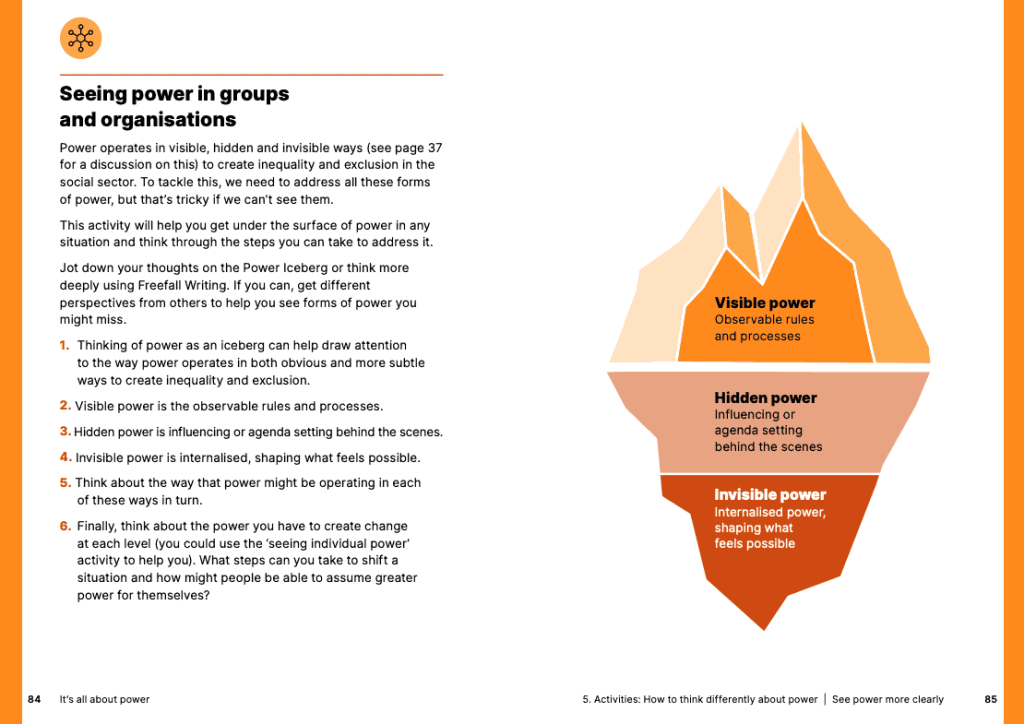By Sheila McKechnie Foundation
Introduction
Power is contextual, and solidarity means different things to different people. This guide, It’s All About Power: A Guide to Thinking Differently about Power for Solidarity in Social Change, includes resources to help you think about how power is at play in your work – and to take action to transform power and build solidarity in social change. This guide is the culmination of a two-year collaborative inquiry, the Power Project, hosted by Sheila McKechnie Foundation. In all, over 300 people contributed to this inquiry in big and small ways.
There’s really no such thing as the ‘voiceless’. There’s only the deliberately silenced, or the preferably unheard. – Arundhati Roy
Who is this guide for?
Anyone serious about social change can benefit from a better understanding of power. Sheila McKechnie Foundation champions civil society in all its forms – from large organisations to small neighbourhood groups. We hope this guide has value for everyone but, fundamentally, this is for people working in the social sector. As our conversations unfolded, we repeatedly found significant challenges in the relationships between formal social sector organisations and people with first-hand experience of social issues. This guide suggests how we might address them. The challenges are systemic. They can’t be resolved by anyone in a single role (eg an Engagement Officer).
Change requires a reimagining of relationships and processes both within and between organisations and communities, and a reckoning of the deep social inequalities that run through the very sector that exists to address them.
Whether you work in service delivery, fundraising, communications, policy, leadership, governance, or grant-making, you have a role to play. We think understanding power can help.
You can’t put responsibility to fix a system on the people who are on the receiving end of it. People in positions of power need to take their responsibility seriously and use it well. – Project participant
Lots of people told us they didn’t want a report, they needed a practical guide to action. This desire for straightforward solutions makes sense, but we have learned that there is no one-size-fits all approach. So, this is not a ‘how to’ guide. We share insights and tools to help you see power more clearly and create a strategy to transform power, but then it’s over to you to make the commitment, and do the work that’s needed in your context, to achieve deeper solidarity for social change.
Contents
- Introduction 7
- Introduction 8
- About the Power Project 11
- Power and the Power Project 12
- Who is this guide for? 13
- 1. Why power? 15
- The lens of lived experience 16
- Trying to share power 17
- Insights: Engaging with the social sector 18
- Why we need to talk about power 24
- What is power? 26
- Thinking differently about power 28
- 2. See power 31
- Tools: The Power Lens 32
- Individual power 34
- Collective power 36
- Civil society’s power 38
- Societal power 40
- 3. Transform power 43
- Tools: The Power Framework 44
- Insights: Taking action to transform power 46
- Develop consciousness and capabilities 48
- Share resources 52
- Create inclusive cultures 56
- Rethink policies and governance 61
- 4. Unleash power 67
- Power, and opportunities for change, are everywhere 68
- Towards a more powerful civil society 69
- 5. How to think differently about power 71
- Activities: Over to you 72
- Talk about power 74
- See power more clearly 80
- Create a strategy to transform power 90
- Glossary 94
- Endnotes and further reading 96
- Acknowledgements 98
- Notes 99
Guide Excerpts
Here are a few sneak peeks into the guide.



Download Resource
Watch Webinar – Civil society, power & creating bolder, braver social change
Watch this related free webinar recording which explores SMK’s Power Project. It calls for a new way of thinking about power and action to build solidarity in social change.
Related Resources
Here are some more resources related to the Guide.
- How to Talk about Power
Thinking and talking about power can feel vulnerable for some. This guide will help you do it more safely. - Individual Power
See more clearly your own power to contribute to deeper solidarity for social change. - Collective Power
See how power operates in groups in visible, hidden and invisible ways. - Civil Society’s Power
Map how different actors in your network enable or constrain your efforts to achieve solidarity. - Societal Power
See how powerful structures and dominant cultural norms affect you. - Power Framework Activity Sheet
The Power Framework can also be used to map the current reality of how your organisation is working alongside people with first-hand experience and create a strategy for change. - Make the case for a conversation about power in your organisation
This summary of the key messages from the Power Project will help you start a conversation with your colleagues about why we need to think differently about power if we are to achieve deeper solidarity for social change. If you use it, we’d love to hear how you get on.
Explore Further
Here are some more resources about power in the Commons Library.
- Power and Power Mapping: Start Here
- All About Power: Understanding Social Power and Power Structures
- A Guide to Power Analysis in Community Organising
- Moving the rock: Shifting power for sustained change
- Power Mapping Guide
Topics: Tags: Format: Language:

